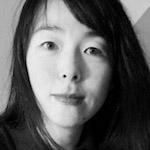The Crabs

Berit Ellingsen
Berit Ellingsen is a Norwegian contemporary and speculative fiction author. She is also a science journalist and has worked as a game, film and music reviewer. Her fiction has appeared in The Harrow and Jack Move Magazine and in the forthcoming SF anthology Growing Dread: Biopunk Visions by Timid Pirate Publishing. Berit admits to pine for the fjords when abroad. Her debut novel, The Empty City, inspired by the philosophy of non-duality, will be available in spring 2011.
+ The Empty City
+ Blog
+ Twitter
Excerpt from “The Empty City”
As soon as the cumbersome splint and elastic bandage was exchanged for less restricting buddy-taping of his broken fingers, Brandon started driving to get out of the apartment and away from the cabin fever.
The ocean road curved north along the bay, past the unattractive concrete silos, hunched-over factory buildings and old wooden docks of the feed plant. Its slim burn chimneys exhaled the stench of rotten fish and death from unnamable interior processes in invisible but undeniable clouds of flatulence. On bad days not even the towers on the other side of the marsh were exempt from the olfactory assault.
The public, press and politicians complained so much about the plant’s looks and odors that the owners finally hid the plant from view with a tall wooden fence. That helped against the sight but did nothing for the smell.
The day had been clear, one of the few that summer. A collapsed stretch of the feed plant’s fence revealed the orange sun slipping towards the horizon.
There was something on the road. At first Brandon thought it was a spill on the asphalt, but when he drove closer he saw that the road was living, moving. Thousands, no tens of thousands, of crabs with purple-reddish shells and yellow feet were moving across the road in an unexpected crustacean exodus. Were they fleeing the pollution in the inner bay?
He stopped the car. The migrating crabs tumbled over each other through the gap in the fence and surged into the ditch between the beach and the road. From there, the stream of hard-shelled bodies flowed across the asphalt, over the shoulder on the other side and into the dry dunes, where tall, sharp-edged blades of grass shivered in the evening breeze.
At first he wanted to go out and fill the back seat with crabs. Maybe they were good to eat? But then he remembered where the crustaceans came from. Their environment contained high levels of heavy metals and hormones from the industry along the coast. Best to take the inland road home tonight. He shifted the gear stick gently with his wounded hand and started backing.
The sound of breaking crab shells was audible even over the song of the engine. The rear-view mirror told him he had gone too close to the crabs. Now they filled up the road behind him as well as in front. Perhaps he could navigate around them? Or if he drove slowly enough, their shells wouldn’t blow the tires? He aimed for the middle of the road, away from the crab-filled ditches, and moved the car carefully.
There was a series of loud cracks. One tire went and then another. Great. The salty body-fluid smell of crab juice drifted into the car. He had no choice but to abandon ship. He got out, the car dinging in protest of the open door. He kicked the noisy metal shut. Paradoxically, the stink from the feed plant was weaker here than further away and downwind.
What should he do? Phone Katsuhiro for transport home? Call a taxi? He wondered what the insurance claim would sound like. He almost looked forward to writing it.
The crabs spilled over his shoes, pant legs and ankles. They pushed and jostled and crawled over each other in several layers, many scuttling fast, some walking leisurely, others weaving confusedly, but all moving in the same direction, as if they were a single mind. To the crabs he didn’t even exist. He was just another obstacle, a part of the warm road and the sand and the grass they had to cross on their way inland.
He sat down on the car’s silver-colored hood and looked at his body and the background of the moving crabs. His body was closer in space than the bodies of the crabs, but both his body and the crabs were simply objects, the same as all the other objects in his field of vision; the fence, the beach, the setting sun.
While he watched, his thoughts and emotions flitted by, uninterrupted and untouched by the movement of the objects in his perception. His mental activity and the bodies existed inside a soft but alive awareness, a feeling of continuous being, that also included the car and the beach and the fence and everything else he saw. The warm and living presence was gigantic and filled the empty city, the world. Was that him?
He watched the glowing awareness and the bodies in his field of vision with intense fascination. When the sun fell completely below the ocean, he waded gingerly through the crabs, and walked home to the honeycomb towers in the warm and cicada-filled darkness.
© Berit Ellingsen
